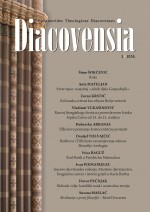SLOBODA VOLJE: KATOLIČKI NAUK I NEUZROČNA TEORIJA
THE FREEDOM OF THE WILL: CATHOLIC TEACHING AND THE NON-CAUSAL THEORY
Author(s): Davor PećnjakSubject(s): Christian Theology and Religion, Human Rights and Humanitarian Law, Political Philosophy, Philosophy of Religion
Published by: Katolički bogoslovni fakultet u Đakovu
Keywords: non-causal libertarianism; event-causal libertarianism; agent-causal libertarianism; incompatibilism; causality; the freedom of the will; action; teleology;
Summary/Abstract: The article discusses the problem of the freedom of the will. The teaching of the Catholic Church says that human beings are gifted with the freedom of the will and the freedom of action. The question is how can we explain the freedom of the will, of choice, and of action. For this purpose, I present a non-causal theory of the freedom of the will, mostly the variant developed by Stewart Goetz, which could serve as the theory that fits the Catholic teaching in the best way. The non-causal theory is a libertarian theory which means that it can explain how an agent, under exactly the same conditions, could choose and do also differently than what he, in fact, did. This theory of the freedom of the will belongs among purposeful i.e. teleological theories, because it explains choices and actions as having a reason for doing something, and the power to choose is an ontologically fundamental power, and therefore it is uncaused. As a result, the execution of this power in forming reasons is also uncaused. Before the comparison with other libertarian theories, an inadequacy of compatibilism is provided. In comparison with agent-causal and event-causal libertarian theories, it is shown that non-causal theory provides a simpler and better solution to the freedom of the will problem, and it also provides a successful answer to the objections of Causalism regarding choices and actions.
Journal: Diacovensia: teološki prilozi
- Issue Year: 24/2016
- Issue No: 3
- Page Range: 469-483
- Page Count: 15
- Language: Croatian

